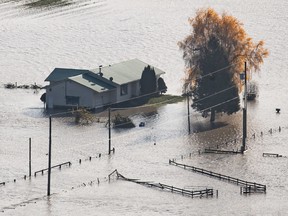How to be prepared for a crisis? Know how things work
When you’re distraught is not the time to start learning about portfolios, the business or family members’ roles

Article content
In her novel Swing Time, writer Zadie Smith imagines two girls. One girl tells her friend that her dad is one of Michael Jackson’s dancers.
Her friend believes the fib, but also doesn’t. Maybe it’s because of the girl’s insistence that it’s true. And so, for a time, the friend holds onto the two conflicting truths, both belief and disbelief. Double-faced facts, Smith calls them.
The trouble is, adults are capable of this, too, to the detriment of family planning and being prepared for a crisis.
Some may truly believe that it’s highly unlikely that a crisis will befall the family and its fortune any time soon. As John Lawson, senior wealth advisor at Sana Family Office in Surrey, B.C., says lightly, “To be an enterprising family, you have to have this crazy gene inside of you, that you are ultimately optimistic.”
Yet, with all seriousness, Lawson and other advisors uniformly emphasize how imperative it is to acknowledge that crises in some form or another are inevitable.
An unforeseen supply-chain bottleneck upending the family business, catastrophic floods destroying family property, a death in the family: Crisis planning must be embedded in the overall family plan and financial structure from the get-go.
“The key is that [families] need to get it done, and sometimes people avoid this type of thing,” says Mindy Mayman, partner at Richter Family Office in Montreal.
A series of ‘what-ifs’
Crisis mitigation is of course all about preparedness. On the most basic level, that means updating the paperwork: “It could be a will. It could be a prenuptial agreement. It could be a shareholders’ agreement. … Sometimes it’s hard to come to a conclusion on executing these documents,” Mayman says, “but the whole point is that the family isn’t left in a crisis with no fallback.”
The next step is more involving. With the estate plans updated, it’s then necessary for family members to meet and discuss what would happen in crisis scenarios — which sounds easy enough, but for families with complicated wealth structures, this could include everything from the family businesses to large investment portfolios or crucial charity commitments and commitments to family members.
Buy-in from all the family members – as to how they will respond using their family charter in a crisis – is important, or it falls apart.
Chris Clarke, First Affiliated Holdings
If the matriarch or patriarch were to die, “what would happen from a mechanical perspective? Who would they contact? Who would take over decision-making in the business? Who would take over decision-making in the family?” Mayman says.
“I don’t know that you can ever emotionally prepare completely for a crisis,” she adds, “but if you’re comfortable with the mechanics, then you can sometimes manage to execute [the necessary tasks] despite your emotional despair.
“Whereas if you’re emotionally distraught, and you have to start learning things from square one, that’s not the right time to get a handle on the portfolio, the business, the foundation, the insurance, the roles and responsibilities of handling the family’s affairs.”
Look to family councils
Jill Sing, an independent family office advisor and wealth consultant in Victoria, notes that a family’s overall business structure can also help in times of crisis by providing extra layers of formalized assistance, such as family councils.
To illustrate this, she points to the oft-cited model of three overlapping rings.
- One ring represents the family members managing the family business, which includes guidance from the business’s board of directors, which reports to the family and can provide additional oversight assistance.
- The second ring represents the family members who are owners of the business. Also among their responsibilities may be looking after the family investments, possibly with the help of an ownership council providing guidance.
- The third ring represents simply the family members, some of whom may be involved in the family business, some not.
“You often will have family members that will have a family council. And the family council is not as focused on the business. The business assets are there to support the goals of the family, but the family council meetings are not focused only on the business and the dollars,” says Sing. This typically includes focusing on the goals and needs of the family.
Problems obviously arise when, say, only a part of the estate planning has been put in place by the matriarch or patriarch, or when some of the estate planning has been kept private from the rest of the family.
“That’s when it’s harder for the surviving members of the family to move forward. Often the families that seek out advice are the ones who want to be proactive. They want to do their risk management. And the most successful ones are the ones that include the next generation in their planning before it’s finalized,” Sing says.
A living, breathing plan
Yet planning isn’t a one-time event, advisors say. Crisis preparedness isn’t a matter of building safeguards and then all is done. It’s ongoing. It means regularly rechecking to make sure things are running as they should.
This is what Chris Clarke, chief executive officer of First Affiliated Holdings, a multi-family office in Collingwood, Ont., describes as the functions of a family charter, “the policies and procedures that ensure business continuity under a number of different scenarios. It’s the tool you use for risk management.”
It’s also where preparedness gets down to the nitty-gritty, such as yearly audits of data storage and backups, as well as checking firewalls and other cyber-security measures. “It also would involve annual audits of the property, liability, travel and cyber insurance coverage. Travel insurance and cyber insurance are just as important as property and liability,” says Clarke.
She adds: “You’d also want to do regular crisis management updates. So, you have strategies for dealing with litigation, dealing with disgruntled employees, how you handle business interruption through catastrophic events.”
This then revolves back to checking decision-making protocols. “Who has final authority? And what are the principles and values that those decisions will be based upon?” Clarke says.
What about the next gen?
With long lists of safeguards to put in place, it’s nevertheless hard to know how concerned families are, given the piling-on of crises recently, from the COVID-19 pandemic to climate-related floods and wildfires. Lawson at Sana Family Office notes that more executives seem to be deferring retirement, therefore causing the transfer of wealth (and presumably, succession within family businesses) to be pushed back at least a few years, in large part due to the pandemic.
The question is how the next generation is reacting to this. Some families may want to maintain the same succession plans and crisis measures. In other families, the younger generation may want a different structure or have crises handled differently. Perhaps a reshuffling of responsibilities rings truer to some.
As Clarke at First Affiliated says, a key issue in crisis management is whether the next generation of the family buys into the plan and follows the crises measures as laid out, or whether changes need to be made.
“Buy-in from all the family members – as to how they will respond using their family charter in a crisis – is important, or it falls apart.”



